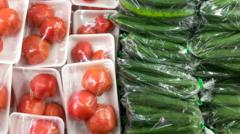Could Banning Plastic Wrap Lead to More Food Waste?

Published: 2025-11-06 19:00:24 | Category: wales
The proposal to ban retailers in Wales from selling fruit and vegetables wrapped in plastic has sparked a debate over potential consequences, including increased food waste, according to Deputy First Minister Huw Irranca-Davies. While the initiative aims to reduce plastic waste, concerns have been raised about encouraging consumers to buy larger quantities than necessary, which could lead to more waste and higher household costs.
Last updated: 29 October 2023 (BST)
What’s happening now
In a recent session of the Welsh Parliament, a proposal was presented by independent Senedd member Rhys ab Owen, advocating for a ban on plastic packaging for fruit and vegetables weighing less than 1.5 kg. This initiative is part of a broader effort to combat plastic waste and promote sustainable shopping practices in Wales. However, Deputy First Minister Huw Irranca-Davies has expressed concerns that such a ban could inadvertently lead to increased food waste, as consumers may opt for larger quantities of produce than necessary.
Key takeaways
- Proposal aims to ban plastic packaging for loose fruit and vegetables under 1.5 kg.
- Concerns about possible increase in food waste and household costs.
- Environmental charity Wrap has cautioned on the potential implications of the ban.
Timeline: how we got here
The discussion surrounding plastic packaging in Wales has evolved over several months. Key milestones include:
- October 2022: Wrap recommends a phased approach to banning plastic packaging for specific fruits and vegetables.
- October 2023: Rhys ab Owen presents the proposal to Welsh Parliament, advocating for loose sales of produce.
What’s new vs what’s known
New today/this week
The recent discourse in the Welsh Parliament highlights the ongoing tension between environmental goals and practical consumer behaviours. Deputy First Minister Irranca-Davies noted Wrap's analysis of consumer behaviour, suggesting that a ban might lead to unintended consequences such as increased food waste and higher grocery costs for households.
What was already established
Wrap's earlier recommendations included a gradual ban on packaging, starting with 21 types of fruits and vegetables. The charity highlighted the importance of considering consumer purchasing habits and potential impacts on pricing, particularly for lower-income households.
Impact for the UK
Consumers and households
The proposal could significantly affect how households shop for produce. If implemented, consumers might need to adjust their purchasing habits. The concern is that without proper controls, the ban could lead to higher prices for loose products, disproportionately affecting those on lower incomes.
Businesses and jobs
Retailers may face challenges adapting to the proposed changes, as their pricing strategies could shift in response to the ban. There are potential implications for supply chains, as businesses would need to rethink packaging and inventory management strategies to align with the new regulations.
Policy and regulation
The Welsh government is considering the practicalities of the proposal, with ongoing discussions about how to implement a ban without leading to negative economic consequences. Public consultations are likely to follow, allowing for further stakeholder engagement on the issue.
Numbers that matter
- 1.5 kg: The proposed weight limit for fruit and vegetables that would be sold without plastic wrapping.
- 21: The number of types of fruits and vegetables suggested for initial consideration for a ban by Wrap.
- £: Potential increase in grocery bills for households if retailers raise prices due to changes in packaging policies.
Definitions and jargon buster
- Wrap: An environmental charity that advocates for reducing waste and promoting sustainable practices.
- Senedd: The Welsh Parliament, responsible for making laws and representing the people of Wales.
How to think about the next steps
Near term (0–4 weeks)
In the immediate future, Welsh ministers will continue to evaluate the responses to the proposal, considering public and stakeholder feedback. Discussions may lead to revisions of the initial plan based on practicalities highlighted by the community.
Medium term (1–6 months)
As consultations proceed, there may be a clearer picture of how the ban could be implemented. Retailers and consumers alike will need to prepare for adjustments, which could include new pricing structures for loose produce and changes in shopping behaviours.
Signals to watch
- Feedback from public consultations by Welsh ministers.
- Retailer responses to the proposed ban and pricing adaptations.
- Data on food waste trends as changes are implemented.
Practical guidance
Do
- Consider purchasing from local grocers and markets that already offer loose produce options.
- Stay informed about the latest discussions and proposals from the Welsh government regarding packaging regulations.
Don’t
- Don’t assume prices will remain stable; be prepared for potential increases in loose produce pricing.
- Don’t overlook the environmental impact of packaging waste; consider reducing plastic use in other areas of shopping.
Checklist
- Research local suppliers that sell loose fruits and vegetables.
- Track changes in fruit and vegetable pricing in response to proposed legislation.
- Participate in community discussions about the ban and its implications.
- Evaluate your own buying habits and consider more sustainable practices.
Risks, caveats, and uncertainties
While the proposed ban is aimed at reducing plastic waste, there are significant uncertainties regarding its potential impact on consumer behaviour and food waste. The concerns raised by Irranca-Davies highlight the need for careful consideration of how such policies could backfire, resulting in unintended consequences that may ultimately counteract the environmental benefits. Ongoing consultations and data collection will be crucial to understanding these dynamics.
Bottom line
The proposal to ban plastic-wrapped fruit and vegetables in Wales encapsulates a critical intersection of environmental sustainability and consumer behaviour. While the aim is to reduce plastic waste, careful consideration of potential unintended consequences is essential. Stakeholders must engage in constructive dialogue to ensure any implemented measures genuinely benefit the environment and do not exacerbate existing challenges for consumers and businesses.
FAQs
What is the proposed ban in Wales about?
The proposed ban in Wales seeks to eliminate the sale of plastic-wrapped fruit and vegetables weighing less than 1.5 kg to reduce plastic waste.
What concerns have been raised regarding the ban?
Concerns include the potential for increased food waste as consumers may buy larger quantities than needed, leading to higher household costs.
Who is behind the proposal?
The proposal was introduced by independent Senedd member Rhys ab Owen, with discussions ongoing in the Welsh Parliament about its implications.



